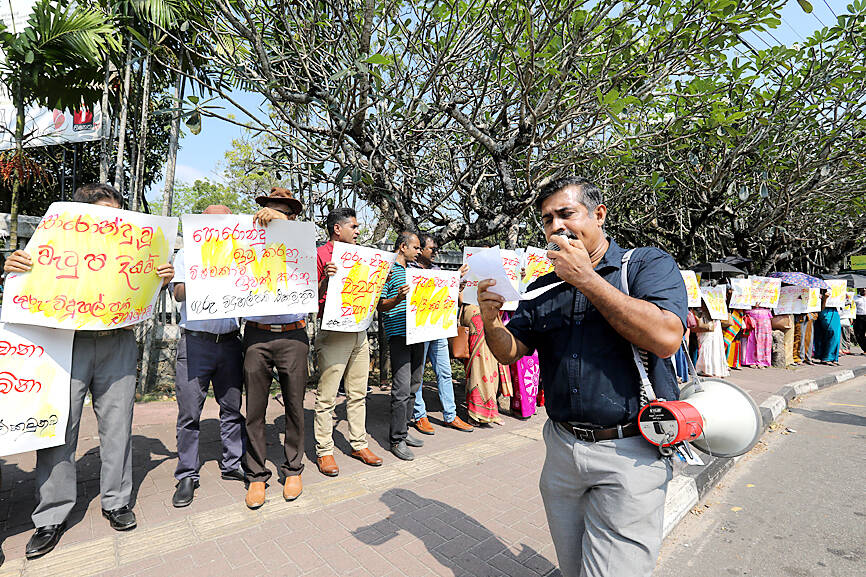Sri Lanka’s fragile economic recovery could be hampered by threatened trade union strikes over reduced benefits for government employees in this year’s budget, the IMF said yesterday.
Sri Lankan President Anura Kumara Dissanayake’s maiden budget raised public sector salaries, but also made deep cuts to longstanding perks in a continuing effort to repair the island nation’s tattered finances.
Sri Lanka’s main doctors’ union is considering a strike from today to protest against cuts to their allowances, while teachers are also considering stoppages.

Photo: EPA-EFE
IMF senior mission chief for Sri Lanka Peter Breuer said the budget was the “last big push” for the country’s austerity program, adding that everyone who can “should make a sacrifice.”
“Sticking with the reforms is really the best way out for Sri Lanka to assure its sustainability,” Breuer told reporters.
“I think it’s important for everyone in Sri Lanka to recognize that,” he said. “This is the last budget where there is still a bit of an increase in revenues needed.”
In 2022, the country endured an unprecedented economic crisis that caused widespread shortages of food, fuel and other essentials. It secured a US$2.9 billion bailout loan from the IMF in 2023, almost a year after defaulting on US$46 billion in foreign debt.
Successive governments have since raised taxes and cut public spending to increase state revenue.
The next year would be less painful, but the country must remain committed to economic reforms, Breuer said.
“This is the last big push,” he said. “Thereafter, it will be much easier going forward.”
The IMF last week released its fourth tranche of US$334 million in its rescue package for Sri Lanka, commending the country for adhering to its economic reform pledges.
“Reforms in Sri Lanka are bearing fruit and the economic recovery has been remarkable,” IMF deputy managing director Kenji Okamura said in a statement at the time.
“Inflation remains low, revenue collection is improving, and reserves continue to accumulate,” he said. “The recovery is expected to continue in 2025.”

VAGUE: The criteria of the amnesty remain unclear, but it would cover political violence from 1999 to today, and those convicted of murder or drug trafficking would not qualify Venezuelan Acting President Delcy Rodriguez on Friday announced an amnesty bill that could lead to the release of hundreds of prisoners, including opposition leaders, journalists and human rights activists detained for political reasons. The measure had long been sought by the US-backed opposition. It is the latest concession Rodriguez has made since taking the reins of the country on Jan. 3 after the brazen seizure of then-Venezuelan president Nicolas Maduro. Rodriguez told a gathering of justices, magistrates, ministers, military brass and other government leaders that the ruling party-controlled Venezuelan National Assembly would take up the bill with urgency. Rodriguez also announced the shutdown

Civil society leaders and members of a left-wing coalition yesterday filed impeachment complaints against Philippine Vice President Sara Duterte, restarting a process sidelined by the Supreme Court last year. Both cases accuse Duterte of misusing public funds during her term as education secretary, while one revives allegations that she threatened to assassinate former ally Philippine President Ferdinand Marcos Jr. The filings come on the same day that a committee in the House of Representatives was to begin hearings into impeachment complaints against Marcos, accused of corruption tied to a spiraling scandal over bogus flood control projects. Under the constitution, an impeachment by the

Exiled Tibetans began a unique global election yesterday for a government representing a homeland many have never seen, as part of a democratic exercise voters say carries great weight. From red-robed Buddhist monks in the snowy Himalayas, to political exiles in megacities across South Asia, to refugees in Australia, Europe and North America, voting takes place in 27 countries — but not China. “Elections ... show that the struggle for Tibet’s freedom and independence continues from generation to generation,” said candidate Gyaltsen Chokye, 33, who is based in the Indian hill-town of Dharamsala, headquarters of the government-in-exile, the Central Tibetan Administration (CTA). It

China executed 11 people linked to Myanmar criminal gangs, including “key members” of telecom scam operations, state media reported yesterday, as Beijing toughens its response to the sprawling, transnational industry. Fraud compounds where scammers lure Internet users into fake romantic relationships and cryptocurrency investments have flourished across Southeast Asia, including in Myanmar. Initially largely targeting Chinese speakers, the criminal groups behind the compounds have expanded operations into multiple languages to steal from victims around the world. Those conducting the scams are sometimes willing con artists, and other times trafficked foreign nationals forced to work. In the past few years, Beijing has stepped up cooperation